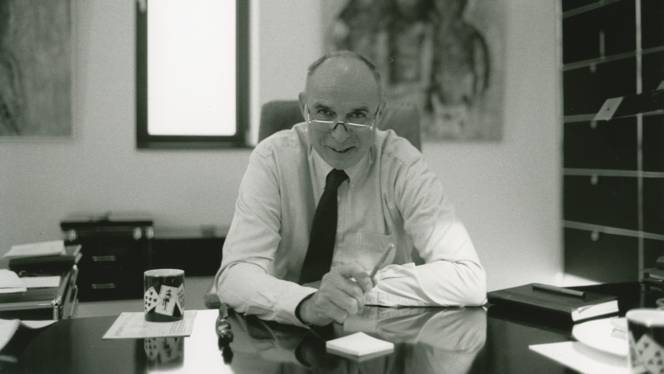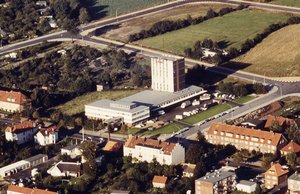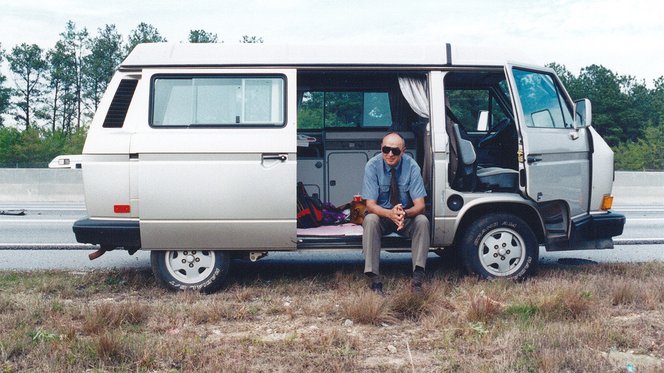We encourage the courage to start afresh.
Our aim is to provide effective solutions to current challenges such as climate protection, resource scarcity and the shortage of skilled workers.
Mission
The Joachim Herz Stiftung is realigning itself. As an entrepreneurial foundation, it is part of our DNA to regularly question our own work and adapt our actions to changing challenges. We want to be measured by our ability to make a real difference, achieve impact and generate social benefit. With our Strategy 2023-2033, we have set the framework for focusing significantly in the future and promoting fewer topics through larger formats.
Basic principles of our foundation work
As a civil society player, our aim is to contribute to the efficiency and freedom of society. We do this by supporting people in developing their personal and professional potential. The focus is on self-determination through personal responsibility and initiative, self-reflection, motivation and openness to the world.
To this end, we promote education and science in research and teaching in the natural sciences, economics, law, medicine, engineering and personal development. Interdisciplinary projects and research approaches play a special role and will be the focus of future funding activities. We are convinced that the combination of different perspectives will help us to meet the challenges of the future as a society.
We are operational and promotional and provide individual, project and structural support.
Unlike publicly funded institutions, we can react quickly and flexibly and are prepared to support experimental and high-risk projects in order to try out new things. Failure is allowed, because we see ourselves as a learning, agile organization that reacts to findings through evaluation and adapts projects and working methods to achieve the best possible effectiveness.
Our foundation is in a position to make a substantial contribution to mitigating the increasingly pressing issue of climate change. This threatens both the efficiency and freedom of society and therefore represents one of the greatest current social challenges. We are therefore committed to the Sustainable Development Goals (SDG) - both in our substantive work and in the way we invest our capital and organize our work.
Particularly relevant SDGs for us are:
- Quality education
- Sustainable cities and communities
- Climate action
- Health and well-being
- Industry, innovation and infrastructure
Articles of Association & Governance Code
Our founder Joachim Herz wanted to use the foundation's assets for the long-term promotion of education, science and research. The focus is on the natural sciences, economics, law, medicine and the promotion of educational institutions, students and charitable organizations.
- Statutes (in German)
- Governance Code (in German)
- Organizational chart
Finances
When Joachim Herz died in 2008, his assets amounted to around 1.3 billion euros (market value). This was the basis of our foundation's assets.
Expenditure for charitable purposes (in € million):
- 2020: 18,9
- 2021: 20,7
- 2022: 24,2
- 2023: 26,5
- 2024: 51,5
The foundation's capital is predominantly invested and tied up in entrepreneurial activities. This is in line with the founder's wishes and is also stipulated in the Articles of Association. The majority of the capital is invested indirectly in Beiersdorf AG, in addition to other company investments. The foundation also has a real estate portfolio in the USA and Germany. The assets are supplemented by a broadly diversified securities portfolio. In all investment decisions, we pursue the goal of preserving the assets in real terms over the long term and generating regular income.
Joachim Herz

Individualist and man of conviction
Joachim Herz was unconventional and cosmopolitan, loved the USA, the can-do mentality there and the entrepreneurial spirit. Values such as freedom and individuality were important to him. He was of the opinion that wealth obliges social responsibility and that both individual and structural support can create new opportunities for young people in particular.
Joachim Herz was eight years old when his father Max Herz founded the Tchibo mail-order coffee business together with Carl Tchilling-Hiryan shortly after the Second World War in 1949. He learned early on how much hard work was involved in building up a family business. His childhood was characterized by thrift and modesty, as the family lived in the usual conditions of the post-war period. This basic experience had an impact on the rest of his life - for although he later inherited such an enormous fortune, he condemned wastefulness throughout his life. He is said to have been unpretentious and had a direct manner - he cleaned his own windows. He was distanced from Hamburg's high society and rejected the glamor of the city centre.

The path to your own company
In the 1970s, he acquired the commercial space of the "Java Kaffee Geschäfte GmbH & CO. KG" in Langenhorn. However, he never roasted or sold coffee; among other things, he had a real estate management company in the USA, which still exists today. The foundation is located on the former company premises and is therefore a conscious commitment to the location.
Due to his father's entrepreneurial history, Joachim Herz considered it essential that young people should have a basic understanding of economic interrelationships and scientific education. Only in this way could they take their place in a democratic, market-based society in a self-determined and responsible manner. We are still committed to these values in our work to promote education, science and research. The guiding principle developed from this, "Knowledge creates freedom", guides our actions in all areas of our work. We think Joachim Herz would like that.

A pair of sneakers behind the back seat
Today, his beloved old VW bus is parked downstairs in the foundation's "tower". Behind the back seat is a pair of old sneakers - one of the many tangible reminders of a generous, unconventional and very special man: Joachim Herz.